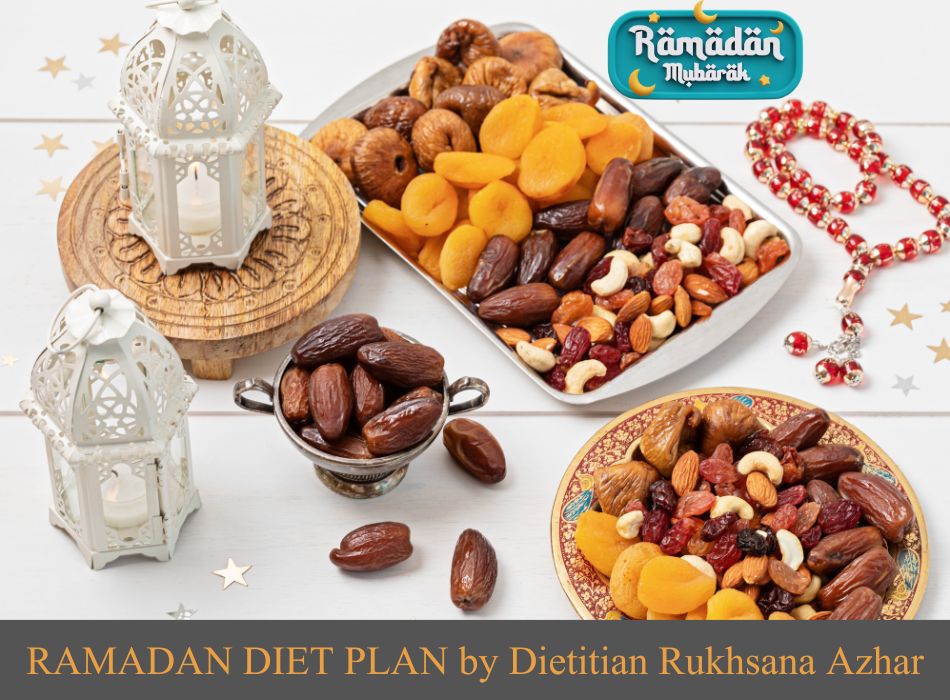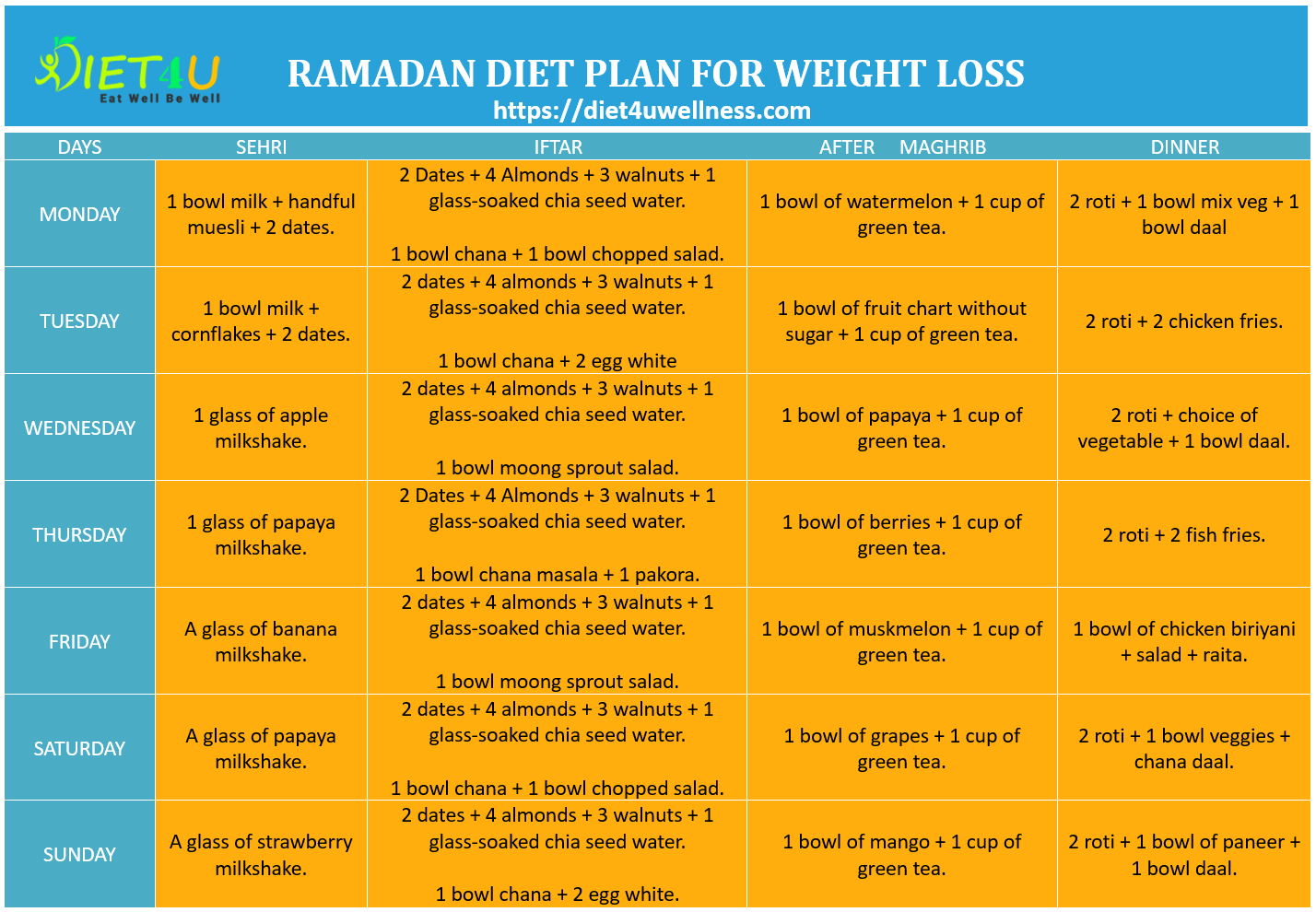
From Fast to Feast: Your Comprehensive Ramadan Diet Plan for Weight Loss and Optimal Health
Table of Contents
Introduction to Ramadan and Its Significance
Ramadan is the 9th month of the Islamic lunar calendar and holds great spiritual importance for Muslims worldwide. It is a time of fasting, prayer, reflection, and community bonding. Observing fasts during Ramadan is one of the Five Pillars of Islam.
Ramadan, which is the time of fasting between sunrise and sunset, is a tradition of great religious significance to Muslims all over the globe. While fasting is an essential aspect of this month of worship, it’s crucial to ensure your diet remains balanced and healthy to have the right amount of energy and protect the well-being of your entire family. In this article, we’ll explore the intricacies associated with the Ramadan diet plan, offering guidelines, information, and tips for food items to help you get the most out of this experience and ensure your well-being.
Healthy eating during Ramadan helps store energy and maintain a balanced weight without gaining extra fat.
Ramzan diet plan will easily keep a weight check and healthily store energy, but only if we follow these tips and tricks; this blog will help answer many questions related to Ramadan diet plan that people find difficult to understand.
The diet you should follow in the holy month of Ramadan is simple and is to follow the principles of a healthy and balanced diet. In other words, a balanced diet is one that has plenty of whole vegetables, fruits, grains along with protein. If you’ve been eating processed or fried foods during Ramadan now is the best time to switch. The change could be achieved by adding whole grains like Brown rice / wheat / oats/quinoa millets, dals/lentils as well as fish, chicken or the consumption of fiber which comes from vegetables, and curd or yogurt to finish the meal. You can break your fast by eating 2 dates and drinking a glass of juice from fresh fruits or the nabeez (prophetic drinks) to enjoy iftar along with this can have a lentil soup, dal and chicken or vegetable rolls and Fruit salad and more. Grill or tandoor cook your food items rather than doing deep fry. Maintain your health hydrated by incorporating Chia or Sabja seeds into your drinks. Avoid caffeine during suhoor because it is diuretic and can result in dehydration. Be sure to keep your portion size in check and do not overdo it. Now we are elaborating Ramadan diet plan for weight loss below.
HOW CAN WE LOSE WEIGHT DURING RAMADAN 2024 EFFECTIVELY?
Losing weight on regular days is a more difficult task than losing weight during Ramadan. Here are some points for effective weight loss in Ramadan.
1. Balanced pre-morning meal (suhoor)
. Eat something protein-rich or carbohydrate-rich or contains healthy fats.
. Try avoiding heavy meals like roti, rice, or biriyani.
. Include fiber in the diet; it will be a good energy provider for the day.
. Remember to drink a lot of water to prevent dehydration.
2. Iftar (the breaking of fast):
. Start with dates and some water to restore hydration.
. have a balanced meal without any sugary drinks like roohafza or artificial juices.
. Stay away from oily and deep-fried items.
. and keep a balance of high-calorie food.
. Eat plenty of fruits; having fruit in the diet will provide vitamins and minerals to the body.
3. Avoid overeating:
. Have control over the portion of foods you eat.
. Use small bowls and plates to create visual satisfaction; it helps maintain portions.
4. Exercising and physical activity:
. Start doing some light physical exercise during non-fasting hours.
. Start with brisk walking and continue with light cardio and strength fitness.
. Avoid exhausting your body with heavy weightlifting and heavy cardio.
5. Hydration:
. Stay hydrated during non-fasting hours, and drink plenty of water.
. Have fruits whole of natural water like melons, pineapples, oranges, etc.
6. Have small meals:
. Only eat a little in one sitting; give yourself a break.
. have a light and nutritious dinner.
7 Days Ramadan Diet Plan For Weight Loss

The beautifully crafted Ramadan Diet Plan for Weight Loss by Dt. Rukhsana Azhar, the visionary behind Diet4u Wellness, facilitates effortless weight loss during Ramadan. Supplementing this with regular exercise and adequate hydration during non-fasting hours can contribute significantly to overall weight loss, according to Dietitian Rukhsana Azhar, maintaining a nutritious diet during Ramadan not only aids in shedding excess weight but also plays a vital role in detoxifying the body, boosting the immune system, and protecting against various harmful diseases.
How to prevent dehydration during Ramadan Diet?
Being hydrated during Ramadan is crucial in maintaining health and wellness for the body, helps in nutrient supply, and plays a vital role.
Ways by which one can stay hydrated during Ramadan are:
1. Hydrate before and after the fasting hour: drink lots of water and eat fruits rich in natural water that help maintain balance during the fasting hour.
2. Consume food rich in electrolytes: Include them in your diet; they have potassium and sodium, which help maintain fluid balance. Bananas and yogurt are rich in electrolytes.
3. Avoid salty foods: Foods rich in sodium can increase thirst and lead to dehydration; choosing moderately salty foods supports overall hydration.
4. Avoid sugary drinks and caffeine: Sugary drinks like roohafzah restrict fluid flow, leading to dehydration. Caffeine is diuretic, so herbal tea and purified water boosts hydration.
5. The essential point is to increase fluid content between iftar and suhoor and have tender coconut water, yogurt, oranges, watermelon, etc., to stay hydrated.
Watch video about Ramadan Diet Plan For Weight Loss
FOODS TO AVOID DURING RAMADAN DIET CHART
1. Sugary and high-calorie content foods: Foods that are high in sugar content can lead to energy spikes and lead to crashes; opting for complex carbohydrates and low-calorie foods will restore energy levels and check on weight.
2. Avoid overeating: While breaking the fast, it is essential to check the quantity of food, avoid overindulging, and eat less but healthy.
3. Avoid processed and packaged food: these are high in preservatives, additives, and unhealthy foods. Incorporate fruits and vegetables into your diet.
FAQ’s Related to Ramadan Diet Plan For Weight Loss
1. What foods should be incorporated in suhoor?
Foods rich in protein, carbohydrates, and plenty of water should sustain energy throughout the day.
2. Can exercising can be continued during Ramadan?
Brisk walking and light exercise can be continued, but schedule it after breaking the fast.
3. Is it okay to have sweets during Ramadan?
Eating moderate sweets can be an option, but having healthier sweets and controlling portion size is essential.
4. How can I avoid overeating?
Overeating can lead to weight gain; it can be resolved by eating small portions, eating slowly, and including fiber-rich foods that can help you feel full.
In conclusion, Ramadan is the month of fasting for Muslims, and it can be a good start for people who want to lose weight. The Ramadan diet plan regime can be incorporated to stay healthy and start the weight loss journey but under the supervision of healthcare providers and nutritionists.

Hello My Name is Dt. Ruksana Azhar and I am a certified dietician and providing online & offline services for Weight Management, PCOS/PCOD Management, Diabetes Management , etc. I have 12+ years of experience in the Apollo Hospital Delhi , Max Super Specialty Hospital Delhi, Lilavati Hospital Mumbai and VLCC healthcare Mumbai. I loves to write healthcare and lifestyle related blog. My favorite part of being a doctor is the opportunity to directly improve the health and wellbeing of my patients and to develop professional and personal relationships with them.




Very useful and best diet plan for Ramadan month.
thanks Afzal to give me feedback.